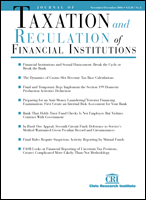Complete Issue
Author: Houman B. Shadab.
Source: Volume 29, Number 05, May/June 2016 , pp.1-56(56)

< previous article |return to table of contents
Abstract:
This issue begins with an article by Asher Rubinstein,who discusses the Internal Revenue Service’s Offshore Voluntary Disclosure Program (OVDP). The OVDP gives relief to taxpayers who are not in compliance with reporting requirements for offshore assets and income. Mr. Rubinstein focuses on the IRS’s Streamlined Filing Compliance Procedures, which apply to those whose failures to comply were relatively benign, and the benefits and risks that disclosure under the procedures entails. He also discusses the issue of determining whether a taxpayer’s noncompliance is willful. Our second article, by Jennifer A. O’Leary and Kevin M. Johnson, examines the impact on private investment funds of the 2015 legislative changes to partnership audit rules, which will become effective for tax years beginning after December 31, 2017. The primary effects include subjecting partnerships to federal income tax upon audit, implications for how partnership agreements are drafted, and significant limits on the use of statements for investments partnerships. Our next two articles focus on aspects of derivatives regulation by the Commodity Futures Trading Commission (CFTC). First, Craig Enochs, Peter Y. Malyshev, Paul Turner, and Michael Yuffee focus on the CFTC’s enforcement actions against insider trading. The authors discuss the CFTC’s expanded authority under the Dodd-Frank Act and focus on a recent turning point involving the first case in which the CFTC brought an enforcement action against an individual for insider trading in commodities. Then, in the following article, Nikiforos Mathews and Jonas Robison provide an overview of the CFTC’s November 25, 2015, proposal to regulate automated trading. Kevin Petrasic, Helen Lee, and Katherine Lamberth, in our fifth article, provide an update on the decision in Madden v. Midland Funding, LLC, which held that the buyer of a consumer loan was not protected by federal law against a state law usury claim. The United States Solicitor General on May 24, 2016, filed an amicus brief disagreeing with the Second Circuit’s opinion and affirming application of the National Bank Act to preempt state law, yet nonetheless recommending that the Supreme Court deny certiorari. The authors discuss the impact of the case and the Solicitor General’s opinion, including the response by marketplace lending practitioners. This issue concludes with an article by Jonathan Sambur and Jared Goldberger, who discuss IRS Notice 2016-08, issued in January 2016. The primary effect of the Notice was to delay the timing of FATCA certifications for participating foreign financial institutions and compliant foreign financial institutions located in Model 2 IGA jurisdictions. The authors discuss the impact of the timing of the certification and other FATCA regulation clarifications made in the Notice.Keywords: offshore tax compliance; partnership audits; partnership-level determinations; Motazedi case; CFTC Rule 180.1; derivatives trading; Prop. Reg. AT; Madden v. Midland Funding; foreign financial institutions
Affiliations:
1: New York Law School.